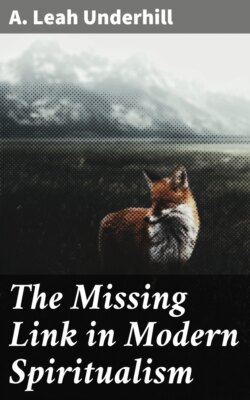Читать книгу The Missing Link in Modern Spiritualism - A. Leah Underhill - Страница 20
На сайте Литреса книга снята с продажи.
CHAPTER VI.
MEDIUMISTIC VEIN IN OUR FAMILY.
ОглавлениеTable of Contents
Some Family Antecedents—Our Great-grandmother—Phantom Prophetic Funerals—Vision of a Tombstone Nine Years in Advance, etc.
I will here interrupt the course of this narrative with a chapter about our family, principally in reference to that peculiar and strange constitutional something, which, in us three children (myself and the two younger ones, Margaretta and Catharine), has come out so strongly into what is called “mediumship,” and which would seem to have been the cause why the “Spirits,” whose instruments we have been, chose us for their purpose, and imposed upon us the burden of what they called “the duty,” against which we thus so long and hard, but vainly, struggled.
My parents were both native-born Americans. My father’s ancestors were German; the name having been originally Voss, which passed through Foss into Fox. In my mother’s family, French, English, and Dutch mingled. Her paternal grandfather, John C. Smith, was of English ancestry. He married Elizabeth Blauvelt, of descent from Holland. Her maternal grandfather was French, Rutan by name, and her maternal grandmother, whose maiden name was Margaret Ackerman, was also a descendant from Holland, and resided on Long Island with her parents until her marriage, after which she removed to New York City, where her only child, my grandmother, was born. She (Margaret Rutan), my mother’s maternal grandmother, had, from childhood, evinced the power of foretelling events. She frequently followed phantom funerals, and entering the grave-yard, would stand and look on until the last rites had been performed, after which she would turn away sorrowing. She never felt timid until the ceremony was ended. Then she would find herself alone, in her normal condition, and remembering all she had seen, and knowing also what would inevitably follow, she would be sadly depressed.
On two occasions she was prevailed upon to tell whose funeral she had attended the previous night, which caused her such intense distress of mind, she besought them to never again urge her to reveal that which was made known to her during her somnambulic walks. The moment the person ceased to breathe, she would say, “Mr. or Mrs. (whoever it might be) is dead.”
If the death had taken place in a distant part of the country it would make no difference, so long as the burial place was there. She felt relieved as soon as the event transpired. She always visited the grave-yard between the hours of twelve and two o’clock at night. My grandfather frequently walked slowly after her to accompany her home on her return.
Another remarkable feature used to attend these nocturnal excursions of my great-grandmother, in the somnambulic condition, when she would thus witness the celebration of funerals of persons who were at the time still alive and well. She would see and recognize all the persons in attendance on the funeral, from the officiating minister down, and afterward remember and relate their names, which used always to correspond with the fact as it afterward came about. She would even tell by whose horses the body was brought to the grave (in the country at that time there were no regular hearses, and this service was performed by some friend or neighbor). When the crowded phantom funeral was over she would awake to find herself alone in the graveyard; sometimes with my grandfather (her son-in-law) awaiting at a little distance to accompany her return home. But frequently she had no such watching attendant, and I remember to have heard it said how distressing it would be for her to awake entirely alone and make her solitary way homeward, from what she knew to be the foreshadowed interment of some one near and dear.
